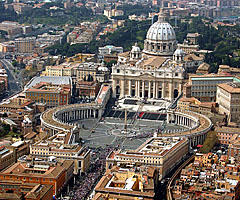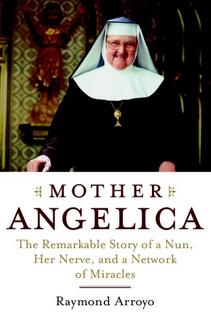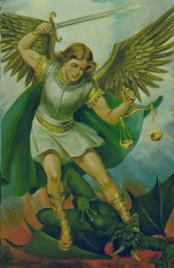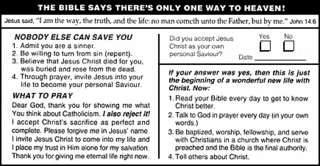The Following is a wonderful response to the widley circulated "18 Questions for 'Saved' Roman Catholics." The piece was written by Gary Hoge and he get's COMPLETE CREDIT for this piece. It can be found on www.catholicoutlook.com and specifically here:
My Fundamental Christian brothers believe they are presenting salvation and the Gospel “the Bible way,” so I’d like to ask them a few questions of my own to see if this is true. First of all, Fundamentalists (and many other Christians, too) claim that the Bible is the “only rule for faith and practice.” Anything outside of the Bible is merely human tradition. I’d like to direct my first set of questions to this doctrine, then ask some more general questions about the gospel, as it’s presented in the Bible:
1. Where in the Bible does it say what books belong in the Bible?
2. If the Bible doesn’t tell us what books belong in it, then is the Bible’s “table of contents” merely a human tradition? If not, why not?
3. If the list of Biblical books is not revealed in the Bible itself, what men drew up the list? Why do you trust these men?
4. Is their list infallible? On what authority?
5. If their list is infallible, isn’t this a “rule of faith and practice” outside of the Bible, thus disproving the idea that the Bible itself is the “only rule of faith and practice”?
6. If their list is not infallible, and is merely a human tradition, why do you
trust it? On what authority?
7. Where does the Bible say that it is the “only rule of faith and practice”?
8. If it doesn’t say that, but you accept it as a doctrine anyway, isn’t that an extra-biblical “rule of faith and practice”?
9. In 1 Timothy 6:17-19, the Bible says, “Charge them that are rich in this world . . . that they do good, that they be rich in good works, ready to distribute, willing to communicate; laying up in store for themselves a good foundation against the time to come, that they may lay hold on eternal life.” In the justification-by-faith-alone scheme, how does one “lay hold on eternal life” by being “rich in good works”?
10. In Galatians 5:19-20, the Bible says, “Now the works of the flesh are manifest, which are these; Adultery, fornication, uncleanness, lasciviousness, idolatry, witchcraft, hatred, variance, emulations, wrath, strife, seditions, heresies, envyings, murders, drunkenness, revellings, and such like: of the which I tell you before, as I
have also told you in time past, that they which do such things shall not inherit the kingdom of God.” If you live in the manner described above, will you inherit the Kingdom of God? If you live this way, are you sure you will be in heaven immediately after death?
11. In Romans 2:6-7, the Bible says that God “will render to every man according to his deeds: To them who by patient continuance in well doing seek for glory and honour and immortality, eternal life.” If good works play no part in our salvation, then why does the Bible say that we receive “eternal life” as a recompense for “patient continuance in well doing”?
12. How do Fundamental Christian churches, which have their own distinct theology, and often boast that they are “separated,” obey God’s command that Christians “all speak the same thing, and that there be no divisions among you; but that ye be perfectly joined together in the same mind and in the same judgment” (1 Cor. 1:10)?
13. Regarding the Church’s leaders, the Bible says, “Obey your leaders, and submit to them for they keep watch over your souls, as those who will give an account” (Heb. 13:17, NAS). Why were the Protestant Reformers exempt from the biblical command to obey and submit to the Church’s leaders?
14. If we are justified by faith alone, why does the Bible say, “Ye see then how that by works a man is justified, and not by faith only” (Jas. 2:24)?
15. If good works play no role in our ultimate salvation, then why did Jesus say, “[T]he hour is coming, in the which all that are in the graves shall hear his voice, and shall come forth; they that have done good, unto the resurrection of life; and they that have done evil, unto the resurrection of damnation.” (John 5:28-29)?
16. If our behavior as Christians has no bearing on our receiving eternal life at the final judgment, then why does the Bible say, “For he that soweth to his flesh shall of the flesh reap corruption; but he that soweth to the Spirit shall of the Spirit reap life everlasting.” (Gal. 6:8)?
17. If baptism is merely an empty symbol, rather than the instrument by which God affects regeneration, then why does the Bible say, “baptism doth also now save us” (1 Pet. 3:21)?
18. If baptism is merely an empty symbol, rather than the instrument by which God forgives sins, then why does the Bible say, “Repent and be baptized every one of you in the name of Jesus Christ for the remission of sins” (Acts 2:38) and “Be baptized and wash away thy sins” (Acts 22:16)?
As these questions, and others you can think of, are discussed in detail, you will quickly see that Fundamentalism does not present salvation “the Bible way.” It presents a man-made gospel, formulated in the nineteenth century by men like B.B. Warfield, Charles Hodge, John Nelson Darby, and Cyrus I. Scofield. Ironically, it is the Catholic Church that continues to teach salvation “the Bible way,” as she has for almost two millenia. It is she who presents the gospel that was formulated by Jesus Christ, and popularized by men like the apostle Paul. And it is she who continues to warn the faithful, in the words of that great apostle, The time will come when they will not endure sound doctrine; but after their own lusts shall they heap to themselves teachers, having itching ears; and they shall turn away their ears from the truth, and shall be turned unto fables. (2 Tim. 4:3-4).












